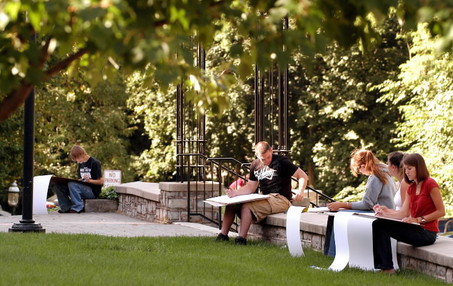We’re told that college is where it’s at. So that’s what you’d expect when you lug your entire life into Terminal E and ship it, along with yourself, to university. If disappointment rears its head during your first semesters, it’s admitted that freshman year, exclusively, is not where it’s at.
And yet, there’s something isolating about this point in our lives. So much shifts from under our feet; the only thing that seems constant is ourselves. In reality, we too are under pressure to change. It’s undeniably hard to find comfort in being pulled in two directions, then three, then four, until you’re not sure if you have moved a lot or not at all.
College does this in more ways than we can count, in more ways than we can manage. The box-of-chocolate assortment of appealing opportunities in the form of classes, jobs, and clubs require selective commitment. The introduction of friendships that bring out particularities of our personality prompt self-reflection and evaluation of relationships.
It’s possible to find excitement in being stretched emotionally, intellectually, and morally. In fact, I had looked forward to doing mental and emotional gymnastics when I left my hometown. But those of us who have always relied on the affirmation of others and the stability of the familiar are knocked off our feet in the dynamic college environment.
The influences in college disrupt an identity based on community, family, and close relationships. Sure, we are handed the extrovert’s toolbox with which we are told to “remake ourselves”: new community and a fresh understanding of ourselves in relation to others. Supposedly, this remodeling is refreshing, liberating, and energizing. Yet, our expectations fall short; these tools are insufficient, for we lack the self understanding needed to use them.
We think that sitting down and contemplating life or looking at ways others have shaped their trajectories might inspire us. Or else, we listen to people tell us, “be happy with yourself,” and “find wholesomeness in being alone.” However, these suggestions seem to be unfair mandates when we don’t know who in fact we are. In the end, contemplating, imitating, and accepting “truisms” is not enough. A mold devised from the paths of others or a fleeting personal aspiration can feel directionless when our identities are in constant flux.
But why do we require ourselves to muster a peace of mind in this whirlwind of change? Why do we seek to be okay with our ever-shifting identity and course, instead of facing it head-on with a healthy unease?
Early last year, my high school friend responded to my anxieties with a text: “You mustn’t belittle your college experience. You have only just begun; the world is your oyster.” What were intended as words of comfort revealed the source of my disorientation. It was exactly this “oyster”—the multiple trajectories for growth—that terrified me, that exposed the void left by a stale high school identity and purpose. But as intimidating and disquieting as this question of “what now, who now?” can be, such an inquiry is also a reminder of the excitement drawn from uncertainty, the luxury of an inexhaustible agency over our lives.
Photo: ieatgrass.com





